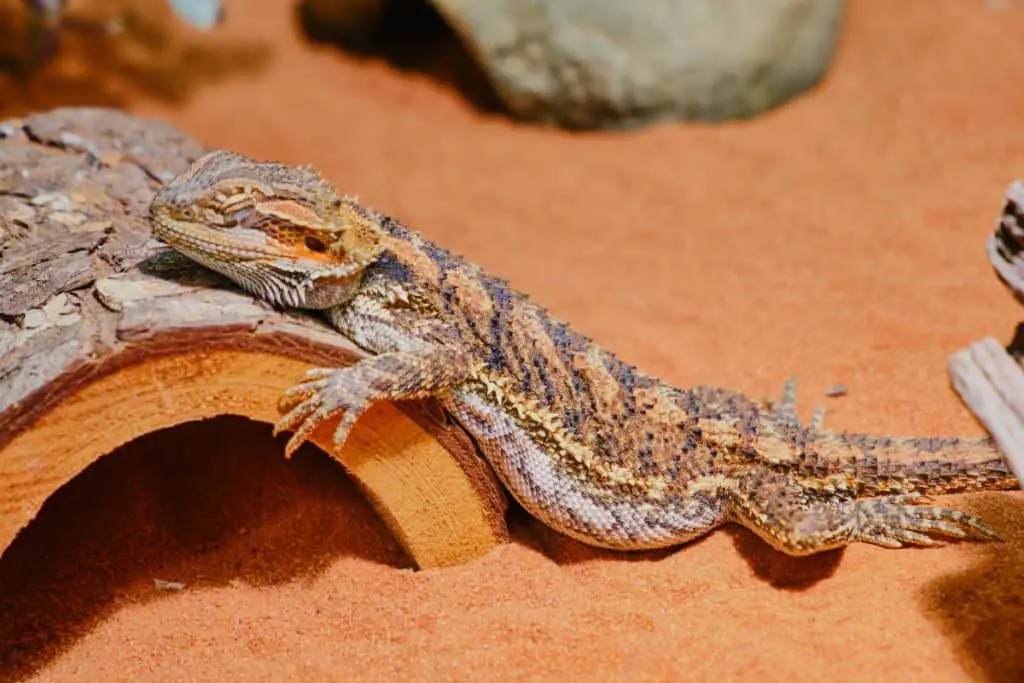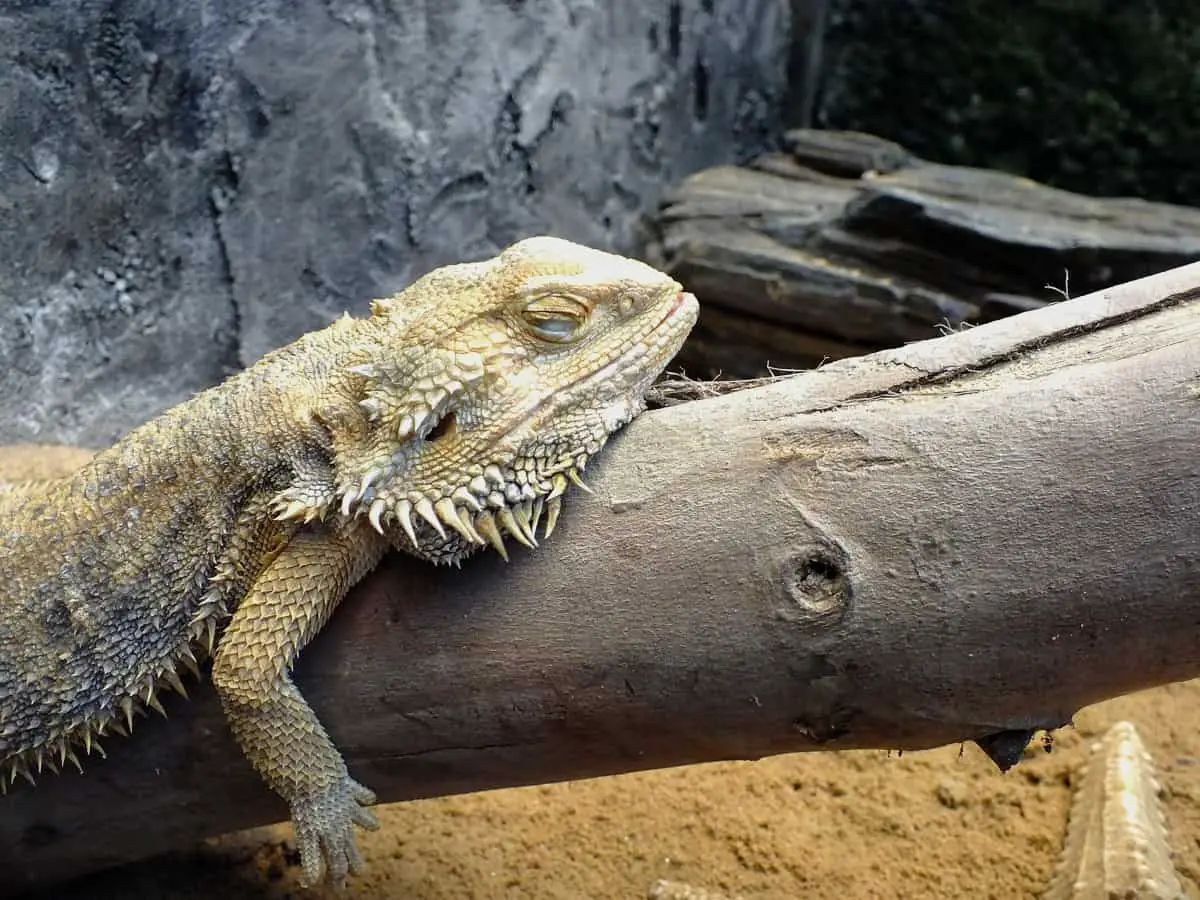Affiliate Disclosure: This post may contain affiliate links. If you make a purchase after clicking on these links I will be compensated at no extra cost to you. However, I never recommend anything I don’t love or wouldn’t use myself!
Bearded Dragons originally come from Australia, where they like to bask in the dry desert warmth. They are also accustomed to the temperature variance that comes from living in a wild desert. So, when you bring your new lizard home, you may notice that he or she has some unexpected sleeping habits.
If you have a really sleepy bearded dragon, there are a number of reasons he or she may be hitting the snooze button. Check through the suggestions below to see why your bearded dragon might be sleeping so much.
Here are 10 Reasons Your Bearded Dragon is Sleeping So Much
1. Your Lizard is Preparing to Brumate
In the wild, bearded dragons older than one year of age begin a cycle that includes a lively active period during warm summer months, followed by a gearing down period in autumn that leads to brumation in winter.
Brumation is the cold-blooded equivalent of hibernation in which bearded dragons go through a period of inactivity to conserve energy.
The difference between brumation and hibernation is that hibernating mammals go into a deep sleep state whereas a reptile in brumation may still move around on warmer days to find water and so on.
Bearded dragons usually “wake” from their brumation in spring, with renewed energy, ready to mate.
This is a long way of saying that the natural instinct of your bearded dragon may have kicked in, and their body is telling them that winter is coming.
2. It’s Dark Out
Unlike most lizards, bearded dragons prefer to sleep at night in the dark. That means that there’s a chance that a particularly dark, rainy day may make your bearded dragon a little extra sleepy.
This is totally normal, and you may even recognize this sleepy response to a stormy day in yourself or your other pets. Even with a good UVA/UVB bulb in their habitat, the external environment can still have an impact on them.
3. It’s Too Cool
Bearded dragons, like all reptiles, require warmth to power their normal bodily functions like digestion. So, when it gets cool out, their organs perform their functions at a slower rate triggering sleepiness in your dragon.
Check the temperature in the terrarium to make sure that your Beardie has an ambient temperature of 75 to 85° F, with a basking spot that reaches 110° F during the day. At night, the habitat should dip to around 70-75° F but you should ensure that it doesn’t drop below 66° F at any point.
4. They Haven’t Had Enough To Eat
Food scarcity in the wild is a trigger that the seasons are changing, so wild bearded dragons will work their way into brumation once they see food disappearing.
If you have forgotten to feed your pet or if they just haven’t eaten enough, their little bodies may seek a snooze for survival. Make sure you’re feeding the little guy or gal enough.
5. Their Diet Variety is Off
Bearded dragons are omnivores, which means they need a diet of both leafy greens and bugs. While most greens will work, they don’t do well with spinach, cabbage, or iceberg lettuce. Try red leaf lettuce or mustard greens instead. For protein, crickets are good but make sure not to overdo it.
Adult bearded dragons need a diet consisting of around 80% fruit and vegetables and only 20% protein, so they only really need protein around twice a week. It is also very beneficial for bearded dragons to have a calcium supplement with their protein.
6. Their Sleep Cycle is Off
While bearded dragons are, in fact, diurnal (meaning, they sleep at night), it is entirely possible that something has shifted their sleep pattern. Possibly, you only think your lizard is sleeping too much because they’re only awake when you’re away.
The most likely culprit is an improper lighting cycle. It’s important to replicate light patterns of nature within your pet’s habitat so they can sleep normally. In summer months your bearded dragon should have around 8-10 hours of darkness which should be increased to around 10-12 hours in the winter months.
7. Your Lizard is Still A Baby
While generally speaking, baby lizards can do well on the same amount of sleep as an adult; they also have a lot of growing to do in their first 12 months.
You should still offer them the same light cycle in their habitat as you would a mature bearded dragon but you can reasonably expect them to use any opportunity to get a nap.
8. Something is Stressing Them Out
If you’ve ever dealt with too many projects at the same time, you know that stress can tire you right out. The same is true for your bearded friend.
Stress can look like illness with low activity, lethargy, and extra stinky excrement and can arise for a number of reasons. The most common is poor habitat, but it could be something as simple as too many loud noises or being handled more than they’d like.
Make sure that there is plenty of space for them in their habitat, and that they’re not sharing with any “friends”. A 40-gallon tank is the best size for an adult bearded dragon and bearded dragons generally do not share well. You could try a nice warm bath to help your bearded dragon to relax.
9. They’re Anxious About Their New Home
As mentioned, low activity levels can develop in bearded dragons as a result of stress. If you just brought your new little friend home, chances are he or she is experiencing relocation anxiety. While this is totally normal, it is up to you to help them adjust to their new surroundings.
Check that their habitat is safe and comfortable. Here’s a good resource to make sure the terrarium is set up perfectly. Then make sure to avoid handling them too much, to begin with, but you can still talk to them in a kind and gentle tone to get them used to your presence.
10. It’s Possible Your Beardie is Ill
While there are a number of other reasons your scaly best friend is sleeping more, one reason could be sickness. Things to check for before assuming the worst are swollen joints, weight loss, refusing food or water, discolored or shedding skin, weepy eyes or runny nose, or loose excrement.
If you’re concerned that your beardie is sick, you can make an appointment with a reptile vet to get your friend back on the healthy side.
Note: make sure to always wash your hands with warm soapy water before and after interacting with your bearded dragon to avoid transference of fungi, bacteria, viruses, or parasites between other pets, yourself, and your bearded dragon.

Do Bearded Dragons Brumate in the Summer?
As previously mentioned, brumation is basically the cold-blooded equivalent of hibernation. You can also see this behavior in turtles, snakes and other reptiles.
Naturally, brumation occurs in the winter, when the temperature is dropping and food is more scarce. However, when kept inside a climate-controlled habitat, your beardie’s body clock may be easily thrown off.
If this is the case, the temperature in your beardies habitat may have dropped. Alternatively, you may not have been feeding them quite as much as you had been previously. That said, your beardies body clock may just be telling them that winter should be approaching.
Since a natural trigger of brumation is a lack of resources and a change in temperature, A bearded dragon in a comfortable and well-stocked environment may avoid brumation entirely.
Schedule a Trip to the Vet
Prior to brumation, your scaly little friend will slow down their normal habits. You’ll see less eating, less activity, and more sleeping. Your vet will be able to assess the general health of your bearded dragon to rule out illness as the cause of your bearded dragon’s lethargy. If that is the case, your vet can help you fix whatever is wrong to make your bearded dragon much happier.
And in the event that your dragon does, indeed, need to brumate, he or she will still need to be given a clean bill of health from the doctor first. A conversation with your vet will also prepare you for how to care for a brumating bearded dragon.
You’ll need to talk to your vet about a feeding schedule, when to bathe your dragon to help them stay hydrated, as well as what temperature to keep the tank and how to set up the lighting cycle.
Take Your Bearded Dragon Outside
If you and the vet have decided that it’s safe and advisable to redirect your bearded dragon’s brumation cycle, something you can try is taking them outside. Obviously, you’ll want to use an enclosure to avoid an escapee bearded dragon and to protect him or her from exposure to possible disease.
The main thing is that they experience real weather. Getting genuine sunlight and direct heat from the sun could trigger their body back into a regular schedule. It may take a couple of days of taking your friend outside for an hour before they are truly convinced.
It is possible for this not to work. If your beardie is far enough along in the ramp-up to brumation, they may just enjoy their little vacations and continue prepping for “winter.” Again, a conversation with a vet will help you decide what is the best course of action for your bearded dragon. Maybe your bearded dragon just needs a better sleep routine.
How Do I Establish a Nightly Routine for My Bearded Dragon?
There are two big factors here in establishing a good nighttime routine for your bearded dragon. The first is your own personal schedule, and the second is adequate dark time.
Personal Schedule
When it comes to your own personal schedule, you probably only factor 8 hours of sleep time for yourself. With that in mind, “put Beardie to bed” a couple of hours before yourself.
A good way to establish bedtime is to figure out when you’re going to be waking up and starting the morning routine. If, for example, you feed your bearded dragon at 8:00 am, then bedtime should be 12 hours prior. That means that at 8:00 pm, you’ll turn out the sunlight bulb, and switch to the lunar bulb.
Adequate Dark Time
As far as adequate dark time goes, natural sunlight may be a factor, as well. If there is lots of natural light in the room housing your bearded dragon’s terrarium, consider shades. While dragons in the wild would become accustomed to shorter nights, bright light glaring in at 6:00 am may not be conducive to a well-rested dragon.
Blackout curtains are an option, but total darkness isn’t always necessary. Shade may be enough to soften the transition from nighttime darkness to daytime sunshine.
Lastly, give him or her plenty of time between dinner and lights out. Heat is a very important variable in proper digestion before sleep. Allow at least 3 hours of time for your bearded dragon to bask under their heat lamp and digest before you start dark hours.
To Conclude
You know your beardie; if you see a couple of lazy days followed by normally active days, don’t fret as that is normal behavior for bearded dragons.
Like you, your bearded dragon may experience lazy periods that you cannot control. The best thing you can do is watch their behavior, offer proper food and water, regulate their light hours and tank temperature.
Try not to worry if it only lasts a day or two, but please recognize when to call a vet for additional support. I, like you, want to make sure that your scaly best friend has a long and happy life.

